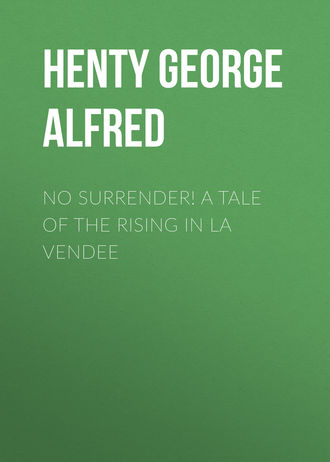
Henty George Alfred
No Surrender! A Tale of the Rising in La Vendee
"There, dear, drink this. You must be strong enough to greet him, as he comes alongside."
She drank it up, and then he helped her to her feet. She stood leaning on the rail, but unable to see the boat through her tears. Leigh ran up a few of the ratlines and waved his cap and, two or three minutes later, the whole crew, clustered along the side, raised a loud cheer as the boat came near.
Patsey held out her arms to Jean, who had, after his first eager signal, dropped back into his seat; and sat there, with his face covered in his hands, until within two or three hundred yards of the lugger. Then he had stood up again. He waved his cap in reply to the cheers of the crew, but his eyes were fixed upon Patsey.
As the boat came alongside he sprang on to the channel, swung himself over the rail, Patsey falling into his arms as his feet touched the deck. The others all drew back and, for two or three minutes, husband and wife stood together. Then Jean, placing Patsey in a chair, turned and embraced Leigh warmly.
"I felt sure that you would bring her back safely," he said. "I never allowed myself to doubt it, for a minute; and as soon as I made the lugger out, from the height there, I was sure that she was on board; and ran down to the coast guard station, and Captain Whittier and the crew were in her, in a couple of minutes.
"Where is Louis?"
"Here he is!" Monsieur Flambard said, coming forward with the child in his arms.
Louis knew his father at once, and greeted him with a little shout of pleasure.
"And you, too, Flambard?" Jean said, after he had kissed and embraced his boy. "I am glad indeed that you, too, have escaped from that inferno they call France."
"Yes, and my wife too, Martin; and, like your wife, we owe our safety to Leigh."
Although they had not met before, Jean and Madame Flambard shook hands as warmly as if they had been old friends, filled as they were by a common happiness.
Captain Whittier now came on board. He had hitherto remained in the boat, in order that the family meetings should be got over before he showed himself.
"I am glad to see you, Master Leigh," he said, shaking hands as he spoke; "though I certainly should not have known you again. You ought no longer to be called Master Leigh, for you are a grown man. We have talked of you, often and often; and it was not until Captain Martin arrived, a week ago, that we had any idea of what had become of you.
"Everyone will be glad to know that you are safely back; and you too, Mrs. Martin. Everyone has missed Miss Patsey, as they still call you when they speak of you."
Jean had been shaking hands with Lefaux and the crew, and now returned.
"I don't know how we stand with this craft, captain. She has come into port of her own free will, and not as a prize. I claim that she is the property of a French Royalist, now an emigre; and as England, so far from being at war with French Royalists, is their ally, I intend to transfer her to my wife, and to have her registered as an English ship."
"Well, I suppose that you will have to settle that with the authorities, Captain Martin; but I should think that you are right, for other French craft have come across with emigres, and have always been allowed to return. Is there any cargo on board?"
"None," Leigh said. "She left Bordeaux the moment she discharged the cargo she brought there."
As they dropped anchor off the island another boat came alongside, with Mr. Stansfield and his two sons, and there was again a scene of tender greeting between them, her, and Leigh.
"Where is Polly?" Patsey asked.
"She was married, two years ago," her father said, "to Harry King, the son of the banker, you know. Of course, she lives in Poole now.
"And so this is your little boy?"
"Yes, but he cannot understand you, at present. We have always talked French with him since the troubles began as, had he spoken a word or two of English, it might have been fatal to him, and to us; but he will soon pick it up, now he is among you all."
It was a happy party, indeed, that evening at Netherstock, where Mr. Stansfield had insisted that Monsieur and Madame Flambard should stay, till they could find a lodging to suit them in Poole. Madame Martin and her daughter, Louise, arrived a few minutes after the others had reached the house; as Jean had sent off a boy to tell them, as soon as he made out the lugger; and a little later Patsey's sister, Polly, came over from Poole.
At first, innumerable questions were asked on each side; and then Leigh related all that had happened, since they left Le Mans. Monsieur Flambard interrupted, when it came to the point where Leigh had rescued him and his wife, and gave full particulars of it to Jean, who translated it to the others. Then it came to Jean's turn.
"I was with Rochejaquelein," he said. "We had made our last charge down on the head of the enemy's column. It was hot work. Desailles was shot through the head, close by my side and, as we rode off, I felt my horse stumble, and knew that it was hit. Almost at the same moment my sword fell from my hand, my right arm being broken by a musket ball.
"La Rochejaquelein had given orders that this charge was to be the last. He knew that, by this time, the main part of the army would have left the town. My horse lagged behind the others, and I was just turning it to ride to our meeting place, when it fell under me.
"I decided at once not to attempt to come to the rendezvous. In the first place, I felt sure that you had already followed out my instructions; and in the next place, had I joined you, I should have ruined your chance of escape. Being dismounted, I should have hampered your flight and, even had we escaped pursuit, your having a man with a broken arm with you would, everywhere, have roused suspicion. I therefore determined to go as far as I could, and then hide in a wood and shift for myself.
"I got a peasant, who was running past me, to stop for a moment and bind my arm tightly with my sash. It was broken high up. I walked, for two or three hours, in the direction opposite to that in which the army had retreated. The peasant who had bound my arm up accompanied me. I found that he came from a farm near us. He had recognized me at once, but I had not noticed who it was. I told him to try and save himself, but he would not hear of it.
"'Monsieur will require my aid," he said, 'and it is my duty to render it. Besides, I am as likely to escape one way as the other. Monsieur knows more about the roads than I do, and will be able to direct me.'
"Of course, I assented, for I was glad indeed to have him with me. As soon as we hid up in a wood, he cut two strips of bark off the trunk of a young tree, cut off the sleeve of my coat and shirt, put the arm straight and, with a strip torn off my sash first bandaged it, and then applied the two pieces of bark as splints, and finally bound another bandage round them.
"He had carried with him the blanket and valises he had taken off the saddle. The latter contained a bottle of wine, and some food, and on this we lived for three days. Then I determined upon starting. He went out in the evening and managed to buy, at a cottage, two loaves of bread and a couple of bottles of wine. We divided these. Then I put on my disguise, and we started in different directions, he making south for the river, which I trust the good fellow managed to reach and cross safely, while I struck north.
"My wine and bread lasted me for four days, by which time I had arrived at Louviers, on the Seine. I was now a hundred miles from Le Mans, and altogether beyond the line of action. I felt comparatively safe. My arm was so painful, however, that I felt that, at whatever risk, I must see a surgeon.
"I went first to an inn, where my appearance as a stranger, and without means of conveyance, excited the surprise of the landlord.
"'You are hurt, monsieur,' he said.
"'Yes; my horse fell under me and threw me heavily, and broke my arm. Before I could recover myself, it had run away. Fortunately a peasant who was going by bandaged my arm up, and I was able to walk on here. Who is the best surgeon in the place?'
"He mentioned the name of the doctor, and said that he had the reputation of being very skilful and kind. He offered to send for him but, being close by, I said that I would rather go to him.
"The man's face gave me confidence, as soon as I entered. I knew that it would be of no use to tell him the story of a fall, and I said at once:
"'Monsieur, I believe doctors are like confessors, and that they keep the secrets of their patients.'
"He smiled.
"'Monsieur has a secret, then?'
"'I have,' I said. 'I have had my arm broken by a musket ball–it does not matter how or when, does it?'
"'In no way,' he said; 'my business is simply to do what I can for you.'
"'It is seven days old,' I said, 'and is horribly painful and inflamed.'
"He examined the wound.
"'The bone is badly broken,' he said. 'It is well for you that it has been bound up with some skill, and that these rough splints have kept it in its place. Of course, what you require is rest and quiet. Without cutting down to the bone I cannot tell how badly it is splintered and, in the state of inflammation that it is now in, I could not venture upon that. I can only rebandage it again, and give you a lotion to pour over it, from time to time.
"Tell me frankly what you are. You can trust me.'
"'I am a sailor,' I said, 'captain of my own craft. I am also a Vendean and, as the cause is now lost, I am making my way down to the sea. I hope, in some way or other, to make my escape to England, where I have friends, my wife being an Englishwoman. What I require more than anything is a suit of sailor's clothes.'
"'I will do what I can to help you, my friend. I am not one of those who think that France can be regenerated by the slaughter of the whole of the best of her people, and by all power being given to the worst.
"'Let me see; I cannot go and buy sailor's clothes myself, but my old servant can be trusted absolutely. There is a shop down by the river where such things are sold. I will get her to go down there, and say that she has a nephew just arrived from sea, and that she wants to give him a new rig out; but as he has hurt himself, and cannot come, she must choose it. What is your height?'
"'About five foot ten,' I said.
"'And how broad round the shoulders?'
"'Forty-three inches. I have plenty of money to pay for all that is necessary, and more,' and I took out my roll of assignats.
"'Since you are well provided,' he said, 'I will take some. The people are very poor, and we all suffer together. They pay me when they can and, so that I can make ends meet, I am well content.'
"In an hour the woman returned, with a suit of rough sailor's clothes, and you may imagine how glad I was to put them on, the doctor helping me on with the jacket.
"'Now,' he said, when I had dressed and eaten some food the old servant had set before me, 'it happens that at daybreak tomorrow one of my patients, the master of a river boat, is starting on the turn of tide for Honfleur. I will first go round to the auberge, and tell the landlord that your arm is badly broken, and that I shall keep you here for the night, as you will require attention; then I will go to the captain, and arrange for your passage. When I tell him that you are a patient of mine, and that I should be obliged if he would find you some quiet lodging at Honfleur, where you can remain till your arm is better and you are fit to be about again, I have no doubt he will manage it. He is a good fellow, and I shall let him understand that you don't want inquiries made about you.
"'Now, you had better lie down on a bed upstairs, and try to sleep. I will call you in time to go down to the boat.'
"'There is no fear of my getting you into trouble?' I asked. 'I would rather go on to Honfleur by road at once, than do so.'
"'There is no fear of that; the maire is a friend and patient of mine. And if, as may be the case, the landlord mentions the arrival of a stranger, and his coming to me; I shall simply tell the maire that, your arm being badly broken, I kept you for the night, and then sent you on by boat; and that as for papers, not being a gendarme, I never thought of asking you for them.'
"The next morning he dressed my arm again, and then himself took me down to the boat, and handed me over to its skipper. He absolutely refused any payment for his services; but I insisted on his receiving a couple of hundred francs, in assignats, for the use of his poorer patients.
"The skipper carried out his instructions to the letter. We got to Honfleur after dark, on the day after starting, and he went with me to the cottage of a widow of his acquaintance.
"He said to her, 'Mother, I want you to take care of this young sailor. He has broken his arm, and wants nursing. He does not want his being here to be known, because he is afraid he might be packed off in one of the ships of war, as soon as he recovers. I suppose you can manage that?'
"'Oh, yes,' she said; 'I have very few visitors, and no one would guess that I have anyone upstairs.'
"'He has plenty of money to pay your charges. Now I will leave him with you, and will look in tomorrow, to see how he is getting on.'
"I stayed there a fortnight, by which time the inflammation had pretty well subsided. No one could be kinder than the old woman was. She used to bathe my arm by the hour, and she fed me up with broth.
"At the end of that time I felt ready for work, though my arm was of course useless. So, having paid my account, I went down boldly to the river and crossed to Harfleur, and then went on to Havre. I stayed there for a couple of days, at a sailors' cabaret; where they supposed that I belonged to a vessel in port, and no questions were asked.
"Finding that it would be difficult to pass the gunboat lying there, I walked up to Fecamp, picked out a likely looking boat afloat by the quay; and at night got on board, rowed quietly out, and then managed to get the sail hoisted. The wind was offshore, and by the morning I was out of sight of the French coast. I laid my course for Portsmouth, and landed there that evening. Being fortunately able to speak English, I had only to leave the boat tied up to the quay, and go up to a small inn close by. I slept there, crossed to Gosport, and walked to Southampton the next morning; and got into Poole on the following day, and soon found where my mother and sister were staying.
"So you see I had, altogether, very little adventure on my way from Le Mans. Since then, I have spent most of my time up here sweeping the water with your father's glass. I had been watching the Henriette, for hours, before she came near enough for me to be sure that it was she; though of course, I could see that she was a French-rigged boat.
"As soon as I made her out I sent off word to my mother, and ran down to the coast guard station. I felt sure that you were on board, for otherwise the lugger would not have come over here. Still, of course, I could not be absolutely certain until I saw that the figure I could make out, standing on the rail, was that of a woman."
It was some little time before their plans were finally decided upon. It was evident that, at present, no trade could be done in French wines. However, as Jean, his mother, and his friend Flambard had sufficient capital to enable them to live without trade, for some time, they agreed that they should establish themselves at once, in London, as wine merchants. Flambard had correspondents in Spain and Portugal, from whom he could obtain wine of these countries; and they agreed that Poole did not offer opportunities for carrying on any considerable trade. Both insisted that Leigh should become a member of the firm and, a month after their arrival at Poole, the party moved up to London.
Madame Martin, her daughter, Jean and his wife took a house, between them, at Hackney; and Monsieur Flambard and his wife established themselves in another, a few hundred yards away.
From time to time came scraps of news from across the Channel. La Rochejaquelein and Stofflet, after being separated from their followers when crossing the Loire, had gathered a small band together, and gained some successes over parties of the enemy. Two grenadiers, after one of these skirmishes, were on the point of being shot by the peasants when Henri came up to save their lives. One of the prisoners, however, recognizing the gallant leader of the Vendeans, raised his musket and shot him dead.
It was not for two years after this that the struggle was finally brought to a conclusion, for the heroic people of La Vendee continued to resist all the efforts of their enemies; until Stofflet and Charette were captured and executed, the one in February, 1796, the other in the following month. The moderation and judgment of General Hoche finally brought about the end of a war which stands unexampled, in history, for the noble resistance offered by a small body of peasants to the power of a great country.
As soon as Monsieur Flambard heard, from his correspondents abroad, that a consignment of wine was on its way they took an office; for it had already been agreed that, having no connection for sales to private customers, they would work only as wholesale merchants, dealing with the trade and with large hotels and other establishments, contenting themselves with the smallest possible rate of profit until they made a connection; and at the end of two or three years, they were doing a considerable business.
The Henriette sailed for France, shortly after their arrival in Poole, as the crew preferred returning home. Lefaux was to trade as before and, being so well known at all the western ports, was certain of obtaining freights. He was to pay wages and all other expenses, and to transmit the balance as opportunity occurred.
Three years later, when the internal affairs of the country had calmed down, Jean managed to get a letter sent to the priest of their village, asking him to inquire about Marthe; and after a considerable time an answer was received, saying that she and Francois had reached home in safety, had been married shortly after their return, and were doing well; having, with their joint savings, purchased at a very low price one of Jean's confiscated farms.
Ten years later the firm of Flambard, Martin, & Stansfield were doing a large business, and when the war came to a termination, and trade with Bordeaux, Charente, and Nantes was renewed, Monsieur Flambard returned to Bordeaux and, having a large connection there, the firm soon became known as the largest importers of foreign wines in London.
Madame Martin had, long before that, died. Patsey was the mother of three boys and two girls, and Leigh had a separate establishment of his own, and had been for fifteen years a married man. Mr. Stansfield was still alive, and things went on at Netherstock in very much the same fashion as before Patsey left home.
Jacques Martin had been one of the many who were guillotined when the terror came to an end, after the death of Robespierre.







